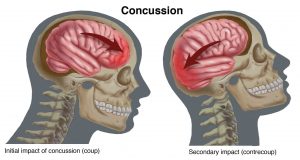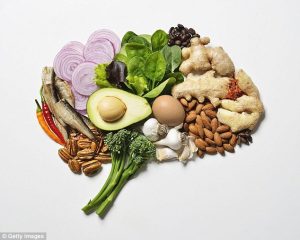What is a Concussion?
A concussion is a traumatic injury that is characterized by a negative effect in brain function. Affects are normally temporary, but can sometimes be long-term, especially in the case of multiple concussions. Symptoms can include headaches, loss of concentration and memory, and loss of balance and coordination. Concussions are usually caused by blows to the head, especially in people who play contact sports such as football and boxing, but they can also be caused by violent shaking to the head or upper body.

The brain is protected by cerebrospinal fluid in the skull from minor bumps and sudden movements. A heavy blow to the head, neck, or upper body can result in the brain sliding back and forth against the inner walls of the skull. With that being said, it’s easy to see that a concussion can be caused by a sudden acceleration or deceleration of the head, especially in a car accident. If severe enough, internal bleeding can occur inside the skull, which can be fatal.
Concussions and traumatic brain injuries are incredibly unpredictable, so it’s important to take steps that are neuroprotective for your brain. One of the most overlooked, but most helpful ways to improve brain health after a traumatic brain injury is healing digestion through improving nutrition.
Brain Injuries Affect Your Gut?
Remarkably, after a traumatic brain injury, there is an increase in intestinal permeability. The exact mechanism for increased intestinal permeability after traumatic brain injury is unknown, but hyperglycemia is found to degrade intestinal membrane proteins, and hyperglycemia is characteristic of brain injury.
What is “Leaky Gut?”
Increased intestinal permeability is commonly referred to as “leaky gut.” In a healthy gut, food is completely broken down into the simplest components of glucose and individual amino acids, which can then cross the gut lining into the bloodstream. In a leaky gut, undigested food particles can cross the gut lining into the bloodstream.
These particles are recognized as foreign in the bloodstream by antibodies, which then trigger the release of inflammatory cytokines, which cause inflammation throughout the body, and are also small enough to cross the blood-brain barrier, causing inflammation in the brain. When there is inflammation in the brain, communication with the gut is reduced, and the gut becomes more permeable, and the cycle repeats itself.
Feed Your Brain
To heal a leaky gut, the simplest way is to go on an elimination diet. This is accomplished by eliminating all grains, dairy, legumes, nightshades, and all processed sugar and foods. After doing this for several weeks, some of these foods can be added in every once in a while.

Another way to feed the brain after a traumatic brain injury is to eat a high fat, low carb diet. Glucose metabolism in the brain is depressed after a brain injury, and the brain can’t effectively use all of the glucose introduced from the diet. To combat this, a diet of mostly fats and low carbs can be used. When the body doesn’t have access to glucose, it converts fats to ketone bodies for fuel. This alternative fuel source releases less free radicals in the body, and is more neuroprotective.
Traumatic brain injuries are always a scary, unexpected experience. Because there is little you can do to prevent an injury from occurring, it is important to know how to feed your brain in the event one does happen.